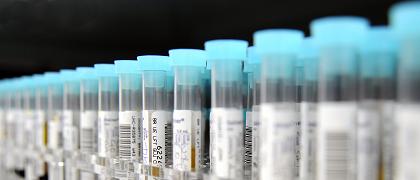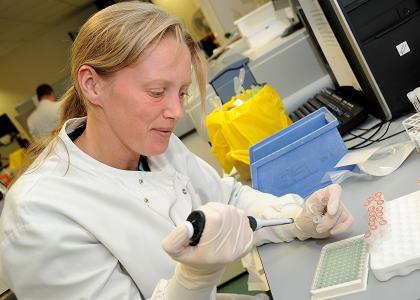
Chemical Pathology is a discipline involved in the diagnosis and management of patients with biochemical and metabolic disorders. Most laboratory analysis these days are performed on automated analysers by Biomedical Scientists whereas Chemical Pathologists and Clinical Scientists oversee the service and offer advice regarding further investigations and management. Chemical Pathologists liaise and support clinical colleagues in the diagnosis and management of complex clinical cases including metabolic problems. Consultant Chemical Pathologists also have a major role in laboratory management, requiring leadership skills and team working skills.
Metabolic Medicine covers a group of overlapping areas of clinical practise with common dependence on a detailed understanding of biochemistry and metabolism. Metabolic Medicine has five clinical modalities: lipid disorders and cardiovascular risk, diabetes mellitus, nutrition, inborn errors of metabolism, and calcium and bone disorders.
Chemical Pathologists/Metabolic Medicine consultants work with a wide range of clinical, laboratory and managerial staff as a part of multidisciplinary teams to provide patient-focused services.
Training in Chemical Pathology and Metabolic Medicine broadly encompass clinical training, laboratory training, research, and teaching. There is a good scope to develop an academic career.
Applying for Chemical Pathology / Metabolic Medicine
Entry is at ST3 following completion of core medical training (CMT) acute care common stem (ACCS) or equivalent and attainment of Membership of the Royal College of Physicians. From 2021/2022 we will also be welcoming applicants from other specialities including general practice, surgery, and paediatrics. Applications are made on-line via the New Oriel system (https://new.oriel.nhs.uk/Web).
 Specialty Attractions
Specialty Attractions
There is a mixture of clinical and laboratory problems, relating to individual patients, in biochemical medicine, ranging across general practice and hospital practice. The nature of the speciality is such that there is a higher likelihood of being involved in the more interesting and complex cases, rather than many routine cases.
The speciality offers flexibility. Consultants in Chemical Pathology and Metabolic Medicine have the prospect to develop a career combining laboratory medicine, clinical work, research, and teaching in the proportions they choose. Consultants can develop their sub-speciality expertise like inborn errors of metabolism or bone disorders and can develop services in these areas. Additionally, the consultants can also pursue other professional interests like laboratory or hospital management or information technology.
Since the speciality offers so much flexibility based on individual and institutional interests, it is difficult to exemplify a typical working week. None-the-less, this is one of the most family-friendly specialities since most on-call work is not residential and allows a balance of work and home life. Less than full-time training and part-time working as a consultant should also be easier compared to most other specialities. On-call advice as a consultant is usually by telephone, but laboratories continue to work 7 days a week, so weekend working is usually done on a rota basis as part of the on-call service.
West Midlands training rotation provides thorough training in all areas of Chemical Pathology and Metabolic Medicine. The rotation does not have any on-call working for trainees and provides plenty of opportunities for personal and professional development including participation in teaching, research and service improvement.
The speciality is rapidly expanding due to developments in diagnostic techniques, automation and informatics in recent times and offers exciting opportunities for the future. There are some opportunities for private practice, either laboratory-based or in the direct clinical care of patients with metabolic disorders.
Personal qualities of Chemical Pathologists and Metabolic Physicians
- The ability to communicate effectively, both verbally and in writing, with patients and staff from a wide range of backgrounds
- A keen interest in biochemical processes and pathogenesis of diseases
- Scientific curiosity and good practical skills
- Self-motivation, attention to detail, ability to prioritise effectively, ability to work independently and ability to work within multidisciplinary teams
- Good problem-solving and decision-making skills
- Good leadership and organisational skills to manage the laboratory
Training sites
- University Hospitals Birmingham NHS Foundation Trust: Queen Elizabeth Hospital, Heartlands Hospital, Good Hope Hospital
- The Dudley Group NHS Foundation Trust: Russells Hall Hospital
- The Royal Wolverhampton NHS Trust: New Cross Hospital and Cannock Chase Hospital
- Birmingham Women's and Children's NHS Foundation Trust: Birmingham Children's Hospital
Journals of Interest
- Annals of Clinical Biochemistry
- Clinical Chemistry
Useful links
The Royal College of Pathologists- Chemical Pathology and Metabolic Medicine
Joint Royal Colleges of Physicians Training Board- Metabolic Medicine
Health Careers- Chemical Pathology and Metabolic Medicine
Contacts
Dr Charlotte Dawson, STC Chair/Programme Director for Chemical Pathology/Metabolic Medicine
Email: charlotte.dawson@uhb.nhs.uk
Current trainees
Dr Samreen Safdar Email: samreen.safdar1@nhs.net
Dr Tejas Kalaria Email: tejaskumar.kalaria@nhs.net
Dr Nathan Lorde Email: nathan.lorde@nhs.net
Dr Ritesh Sah Email: ritesh.sah@nhs.net
Page Last Updated 11th December 2020